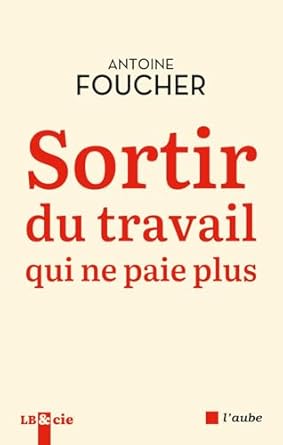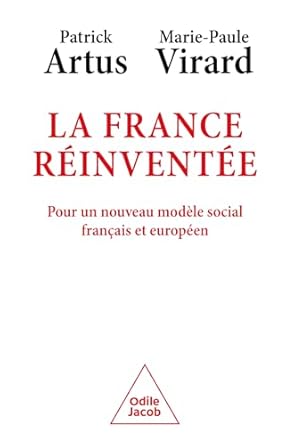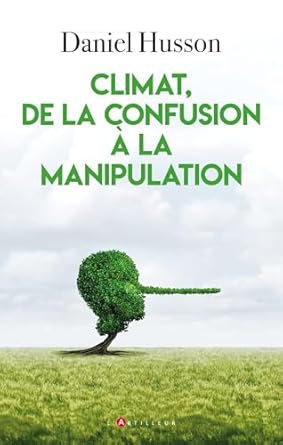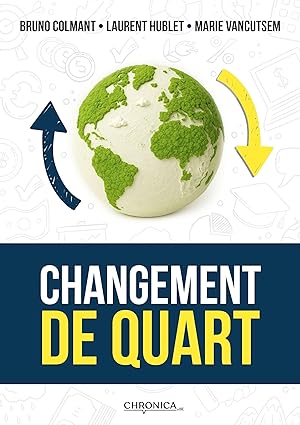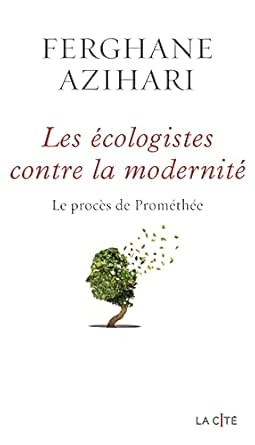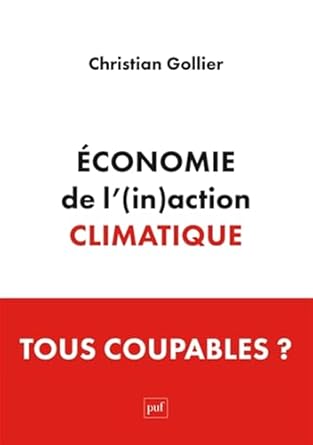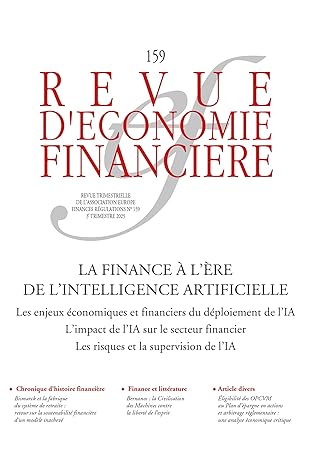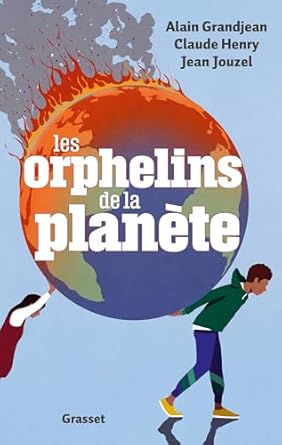The reader will not find in this booklet “the means to earn more by working less”, but he will know how to rebuild a society based on work, allowing both to live better and acquire wealth. The author notes that labor productivity has declined since the 1980s, due to the country’s de-industrialization and the weakening of skills due to educational downgrading. He recalls that France was downgraded from the 6th to the 27th place in the world ranking of GDP per capita. He notes that the purchasing power of the French is no longer progressing and that two-thirds of their wealth comes from inheritance. The French who do not work live better than those who do. Work only supports purchasing power through social assistance in all forms. The progressivity of taxes and contributions financing these aids also discourages employees from working overtime and employers from recruiting and/or increasing the wages of their employees. Workers retain, on average, only half of their gross earnings, while annuitants receive a third, retirees a sixth, and heirs less than a tenth. This results in different forms of resistance to work, which mobilize more protesters than other social conflicts, encourage sick leave, “silent resignations” and/or rejections of “bullshit jobs”. In 2025, the working population must also support twice as many retirees as in 1980. According to the author, this phenomenon is due to an unequal distribution of the value created by labor, which favors both financial and real estate capital. The French no longer believe in the “collective discourse” that orders them to get back to work. The author therefore strives to propose a new “social contract” aimed at bridging the gap between the living standards of workers, rentiers, retirees, and heirs. He proposes measures to enhance the value of work and the purchasing power of assets through a better remuneration, thanks to more professional training, a revival of innovation (especially through AI), a reindustrialization of the country associated with a limitation of imports of dumped products, a more flexible employment and a greater professional mobility. He advocates a “revenge of employees on customers”, by redistributing VAT rates in favor of basic necessities. He advises building a “new ideal of work”, based on the values of responsibility, respect, and empathy. The author engages in a rigorous and educational exercise of analyzing the French evil of professional attrition and puts forward coherent proposals to address it.Antoine Foucher was the Chief of staff of a labor Secretary. He currently heads the consulting firm Quintet. Jean-Jacques Pluchart
Clément CARBONNIER, Toujours moins. L’obsession du coût du travail ou l’impasse stratégique du capitalisme français, Eds La découverte, 2025, 180 pages.
Clément Carbonnier traces the history of French labour policy since the post-war period. He argues that there is no economic relationship between the cost of labour and productive employment. He shows the diversity and complexity of the mechanisms implemented to transfer the financing of social protection, limit its cost and ensure wage moderation. He analyses the side effects of these policies, such as the development of private protection, the introduction of social minima and the taxation of wage supplements. These measures have all been inefficient since the French employment rate – especially among young people and senior citizens – is one of the lowest in Europe. These policies have, however, been justified by the prevailing belief that public jobs are unproductive and that only private employment is efficient. The current imbalances are due to an uncontrolled decline in compulsory levies, taxes on companies and income from assets and reductions in contributions on salary supplements and contributions. The revision of these measures would generate a wave of discontent because it would only have long-term effects, which has dissuaded elected officials from reforming. The author is convinced that in the absence of political courage, the French state will be forced to comply with the rules imposed by international institutions and markets. The author therefore tries to show the inextricable nature of the social problem and the inevitability of international economic sanctions in the absence of reform. He reveals the extent of the impasses facing French society and the difficulty of emerging from them through neo-liberal or post-Keynesian policies. Measures to restore fiscal balance, social equality and business competitiveness, are a “squaring of the circle” because they involve structural reforms and a radical revision of the current social regulation mechanisms. The main interest of the book lies in its analysis of the scope and limitations of successive social policies and the reasoning held by neo-liberal and post-Keynesian policymakers to avoid a widening of deficits and an increase in social debt. Clément Carbonnier is a Professor of economics at the University of Paris I and the author of numerous books. Jean-Jacques Pluchart
Patrick Artus & Marie-Paul Virard, La France réinventée, Eds Odile Jacob, 170 pages.
In this latest opus, the authors, who are not at their first book together, look at some long-term proposals to reinvent a social model for France and Europe at the end of the history in the face of the ambitions of the United States and China. This first quarter of the 21st century has been marked by a spectacular drop in the European economy and even more so in the French economy. Since 2002, the US GDP has grown twice as fast as the European GDP. And this slide continues regardless of the elements of analysis used, productivity, R&D, investment, employment rate, trade balance, training, etc. France has even fallen behind on its own continent compared to its neighbors. The irresistible French de-industrialization has not been offset by the development of a significant technological sector, the debt and the trade deficit are abyssal, the quality of public services is deteriorating despite an ever-increasing budget deficit, and finally, the wealth per capita is 15% lower than that of Germany. Europe is at odds with Schumpeter and is paying a high price for its risk aversion. 54% of American R&D is devoted to new technologies compared to 15% in Europe, which prefers to continue investing in its old industry. Nine of the top ten European capitalizations are in traditional sectors, while nine out of ten of the American ones are related to technology and AI. The major asset of the American model lies in an ecosystem favorable to innovation and investment, which contrasts with the European model, hampered by a restrictive fiscal, legislative and regulatory frameworks. It could be summarized in a slogan: the taste for risk versus the “precautionary principle”. But this very “business friendly” American model hides weaknesses. Inequalities and impoverishment continue to grow, the exorbitant cost of care is a factor of indebtedness, and the financial situation of the Federal State, despite or because of the dollar, is catastrophic. While Donald Trump has promised the Americans to return to the golden age of the McKinley period, will a weakened and demoralized Europe be able to react? To do so, it will have to get out of the trap of weak growth, regain its dynamism, and defend its positions in the global struggle. The authors make concrete proposals at both the national and European levels. The urgent needs of French reforms are known, as well as the solutions. Choices will be imposed on us if we want to perpetuate our social model. But above all, we must find consent and active involvement in a context where exasperation, deadly dialectics, and mistrust of our leaders prevent all necessary reforms implementation and fuel the ineffectiveness of democratic models. Patrick Artus is an economic advisor to Ossiam and a member of the Cercle des économistes. Marie-Paule Virard is an economic journalist Ph Alezard
Daniel HUSSON, Climat, de la confusion à la manipulation, L’Artilleur, décembre 2024, 192 pages
“In life, there is nothing to fear, but everything to understand” (Marie Curie) The issue of climate concern, an emotional and anxiety-provoking matter, is nothing new! For these reasons, it requires greater clarity and the expression of arguments that are not based exclusively on linear extrapolations. Indeed, the IPCC report of March 2023, which predicts a global cataclysm, is considered by the author to be binary, political and overly alarmist. Its ambitions confront us with an extremely urgent problem in terms of decarbonisation. France claims to be carbon-virtuous, emitting 1% of global CO2. However, we can see that the actions of nations are not synchronised. Based on this observation, physicist Daniel HUSSON enters this confrontation determined to separate fact from fiction. In 13 well-argued and insightful chapters, he presents the importance of returning to reason in order to moderate the fears that have been generated, by looking at things from a different perspective to understand the cyclical changes that explain the structure of movements and causes. He points out that the planet’s climate system is an oceanic mechanism, which explains both the stability of the atmosphere over a long period and the erratic oscillations in the oceans, i.e. climate variability. Because: It is the ocean that dictates its law to the air. That’s how it is! It is established that climates have changed naturally and continuously since the beginning of time. Nature sets the laws, and humans are part of them. As long as the sun shines, the Earth’s axis remains tilted and the precession of the equinoxes continues, the Pole will remain a cold spot and the Equator a hot spot. This plea is like a blade ready to burst the bubbles that thrive here and there to make humans feel guilty at the expense of other justifications. Not giving in to sustained panic, playing things down, resorting to a plurality of viewpoints, putting things into perspective and setting the record straight: that is the stated aim of this informative book. . Daniel HUSSON is a physicist, teacher, researcher and trainer in physics since 1992. He teaches thermodynamics and Einstein’s theory of relativity at the University of Strasbourg. Author and co-author of more than seventy international scientific publications, he has also published Les Quarks, histoire d’une découverte (Quarks: The Story of a Discovery) – (Ellipses). Book review by Freddi Godet des Marais – Club Turgot 2025
FARAH Frédéric, No Frexit, Ce que les jeunes pensent de l’Europe. Eds Fayard, 154 pages.
The author approaches the European subject by probing the opinions of his high school and college students. The students surveyed were from Seine-Saint-Denis, the 5th arrondissement of Paris, and Tolbiac University. Are young people passionate about the European project? Do they feel more European than French? Do they know the European institutions? Bagnolet high school students are mostly from immigrant backgrounds and live in difficult family circumstances (some parents are unemployed). They note that Europe may be a market offering opportunities. Given its presence in the media world, the European Central Bank (ECB) is perceived as a monetary regulation institution. However, the other European institutions are less well known: the Parliament, the Commission, the Council. The Schengen area is highlighted for the convenience of traveling in Europe. It should be noted that all they have known is the euro,. Preparatory classes students (Paris 5th and 16th arrondissement) are of different sociological origins (more affluent social background), they adhere to the idea of a Europe that facilitates trade between its members. The approach of Tolbiac Univeristy students is a little different: they know better the various workings of the institution. Like their prep colleagues, they recognize the importance of the role played by the European Central Bank (ECB). They also note the importance of collective action during the financial crises and the COVID-19 pandemic. In conclusion, no group of students mentioned the idea of a “Frexit”. It should first be noted that students see the practical side of Europe because of the existence of the Erasmus program: it is a way to open up to other horizons and other cultures and makes them aware of their belonging to Europe. It was created in 1987. These young people were born after the creation of Europe and the euro: it would not occur to them to question it. One particular point brings negative remarks: the social aspect. Indeed, because of the commercial competition between members, employees earning minimum wage may find themselves unemployed. Some industries are relocated to lower wages countries . This book brings us closer to the concerns of these young people: we must listen to them and enlighten them on the path of Europe They will be the ones driving future European progress. Frédéric FARAH is a professor of economic and social sciences, a professor in preparatory classes and at the University of Paris 1 Panthéon Sorbonne. Renzo Borsato
Bruno COLMANT, Laurent HUBLET, Marie VANCUTSEM, Changement de quart, Eds Chronica, 2025, 172 pages.
The book brings together representatives of three generations and three disciplines (economics, philosophy and journalism), who freely discuss the main “global social facts” (in the sense of Max Weber) that occurred during the first quarter of the 21st century and the perspectives opened up on the second quarter. The debate focuses on five main themes: demographic change, technological and economic change, political recomposition, health protection and the climate challenge. The phenomena that have most marked the global consciousness since the beginning of the century are the rise of terrorism – marked by the attack on the World Trade Center – the financial crisis of 2008 and the development of AI since 2022. These events have led to a questioning of the neoliberal principles defined by the Washington Consensus. The launch of the chatGPT software has revealed the creative destructive power of social networks and AI, and in particular, the ability of digital applications to influence, the monopolistic position of their developers and the speculative nature of their stock market shares. These events have contributed to the rise of populism and authoritarian regimes. In Europe, they have led to a reappraisal of the most permissive and expensive social models. The authors recognize that projecting the 2050 horizon is difficult. They envisage a “Europe that is undoubtedly greyer”, but more united between generations and within each generation. The authors call for a more rational assessment of the impacts of AI on the organisation of work and social life, a “more participatory and local” democracy, a “reconciliation of health and care”, and a climate transition that better integrates short- and long-term requirements. Through the sagacity of their exchanges, the authors invite readers to reflect on the control of their destinies. Bruno COLMANT is an economist, teacher and former director of financial institutions and member of the Royal Academy of Belgium. Laurent HUBLET is a philosopher and entrepreneur. Marie VANCUTSEM is an audiovisual journalist. Jean-Jacques Pluchart
Ferghane AZIHARI, les écologistes contre la modernite. Le procès de Prométhée, La Cité 208 pages.
Ferghane Azihari is the son of Comorian emigrants whose parents “did not only flee material poverty. They also escaped pollution that kills six to fifty times more in sub-Saharan Africa than in Western Europe”. From the introduction, the tone is set for this fascinating critique of the current ecology in our countries. He dismantles one by one the declinist, Malthusian and anti-capitalist arguments of these movements which, warm and sheltered, dream of becoming good savages again. He demonstrates that far from ravaging the planet, the technical progress opposed by Greta Thunberg, Nicolas Hulot and others has made it possible to greatly improve the human condition, including in the poorest countries. In a dream world, hunter-gatherers have in reality destroyed more through their overexploitation of resources than agriculture has made it possible to reduce. Technical progress and the industrial revolution have gradually made it possible to reduce pollution in developed countries as well as reducing working hours. The real solution is therefore to believe in technical progress, associated with individual property which allows the protection of wealth as opposed to collective property, where no one has an interest, as shown by the state of the ZAD of Notre-Dame des Landes. Regressive ecology is a luxury of rich countries; are we going to force emerging countries to remain at their current economic level, or even regress? The author also shows that the most radical ecologists are for the most part anti-capitalists who have been reconverted after losing their clientele to technical and social progress, and that this explains their hatred of property and progress. A work that goes against the grain and is ultimately beneficial at a time when prophets of doom are almost the only ones with the right to speak. Ferghane Azihari is a public policy analyst, general delegate of the Free Academy of Human Sciences and member of the Society of Political Economy. Christian Chouffier
GOLLIER Christian, Économie de l’(in)action climatique. Puf, September 2025, 453 pages
Right from the start of the book, the introduction is striking, because based on successive failures on the climate front, the economist fears, at worst, a possible collapse of civilization and, at best, the possible replacement of our liberal democracy by an illiberal and therefore less democratic system because of climate inaction. Through his book, he therefore proposes the solution of introducing a carbon price (CO₂ tax) that could help save the common good in terms of nature in relation to climate change. To do this, in the first part of the book, he shows that the problem of energy transition is a problem of allocating decarbonization efforts among a multitude of economic agents. He highlights a large number of quantified calculations between, on the one hand, the CO² emissions emitted by traditional economic activity, and on the other hand, the actions to be carried out today and tomorrow by economic actors in order to move towards the net zero emissions (NZE) objective by 2050 (limiting global warming to 1.5°C). Then, before tackling carbon taxation, he demonstrates the current contradictions of homo economicus, who wants to do something for the planet, but who in fact does not want to spend more for the same product/service; in other words, the social unacceptability of alternative climate policies. On this subject, he therefore addresses the fact of the stowaway, because the economic actor who acts on decarbonization bears the full cost, and does not benefit in any way from the climatic benefit of this action (the costs are private, and the benefits are socialized). In fact, he goes on to propose and explain his theory of introducing a single carbon tax (of the order of €250/T according to his calculations) equal to the carbon value. The principle being that everyone will make the effort to decarbonize if and only if its cost per ton of CO² avoided is lower than the carbon value. This assumes the establishment of a well-calibrated subsidy system, with this uniform carbon tax generating a social optimum. But in an open world, while the new presidency of the United States is making every effort to deploy its economy with traditional energies, the effort required must take place at the global level and not the national level, hence the problem of the stowaway. In addition, the author highlights an innovative idea proposing that the European Union set up an independent Carbon Central Bank (CCB) to manage the evolution of the price of carbon on an emission permit market covering the entire Union. Subsequently, the goal would be to raise the price of carbon to a level where oil and gas would no longer be competitive with renewable energies. Finally, while there is no simple solution to the energy transition, and many intellectuals today fail to see the challenges posed by the debate surrounding climate policies that are undermining our liberal democracy, economist Grollier simply wanted to show that carbon pricing was the least bad solution. This book helps us understand all the current economic issues we are facing without always realizing their full significance, as well as the major events that are shaping our century, such as electric cars, heat pump heating, soft mobility in cities, green steelmaking, e-fuels for aviation and maritime transport, etc. All that remains is to convince the global population… Christian Gollier is an economist, co-founder and director of the Toulouse School of Economics and his work focuses on the climate economy (recent works: “Entre fin de mois et fin du monde” and “Le climat après la fin du mois”) and on the science of decision-making in uncertainty. Claude GEORGELET
Revue d’économie financière, La finance à l’ère de l’intelligence artificielle, 260pages
Artificial intelligence has become a cross-cutting technology that concerns all economic sectors and has applications in all use cases as soon as there is a layer of analysis. AI has the potential for systemic transformation by simultaneously changing the way the entire economy produces, organizes and innovates. The financial sector is, of course, not exempt from these changes. Computers in the 1970s enabled the emergence of quantitative finance and the development of sophisticated mathematical models to assess risk and optimize portfolios. But AI is specific by its autonomy, its ability to interact in natural language, to adapt its decisions through learning, to process and analyze huge volumes of data in real time, and to convert textual information into investment strategies. These few examples, already adopted in daily operations, suggest disruptive upheavals in the sector. This issue of the “Revue financière d’économie,” edited by Marie Brière, explores the issues as well as the economic, financial and ethical challenges, and the impacts and risks associated with the increasing integration of AI in the financial sector. Thirteen leading contributors, such as Cédric Villani, Philippe Aghion, Agnès Bénassy-Quéré, to name but a few, provide a valuable synthesis around three main themes. The first is devoted to the economic and financial challenges of deploying AI. It addresses the strategic needs in terms of funding and research related to AI, ethical issues, recalling that humanity invests ten times more in AI and digital technology than in the ecological transition, the impacts on the dissemination of innovation and productivity and finally digital currencies and the role of fintechs as well as central banks. The second part addresses some use cases of AI and generative AI in finance. The various contributors revisit integration strategies in scoring, payment default, loan applications, insurance claims management, and cyber risk prevention, but show that these productivity gains can be offset by new, less visible risks. In the last part of this issue, the experts focus on the risks and the different regulatory approaches, and in particular on the ability of regulatory authorities to use AI to assist them in their control mission.This issue of the “Revue d’économie financière” offers us a rather comprehensive approach to the current debates on the complex issues of the use of AI in the financial sector. Marie Brière, is Head of Investor Research at Amundi Investment Institute, Associate Researcher at Dauphine and ULB and President of Inquire Europe. Ph Alezard
Alain GRANDJEAN, Claude HENRY, Jean JOUZEL, Les orphelins de la planète, Eds Grasset, 186 pages.
The authors respond to the main questions raised over the past thirty years by the impacts of global warming and the energy and ecological transitions. They recall the warnings issued since 1990 by the IPCC and other official bodies, as well as the (often disappointed) ambitions set out at the 29 Conferences of the Parties (COP) organized since 1995. They emphasize the importance of COP 21, held in Paris in 2015, which set a target of limiting global warming since the 19th century to 1.5°C by 2030 and achieving carbon neutrality by 2050. The authors reveal that IPCC reports have been the target of a veritable climategate, orchestrated by energy companies, which have sought to discredit the IPCC’s data, processing, and conclusions through biased studies. They also denounce banks that continue to finance projects that harm the environment. They point out that the multiple consequences (particularly on human health) of greenhouse gas (GHG) emissions are increasingly well documented and that a warming of 3°C or even 4°C would be catastrophic for the planet and humanity. They warn of the severity and simultaneity of recent natural disasters (droughts, floods, etc.). The authors are optimistic, however: they identify the devices to be implemented in order to achieve the objectives set by the COP: new instruments of “green finance”, alternative systems of heating, transportation and production, ecological materials… They show the progress of agroecology to preserve the soil and absorb GHGs, as well as the emergence of geoengineering that extracts carbon monoxide from the atmosphere. They hold up European countries as examples for nation states that are less economical with fossil fuels, such as China and the United States. Alain GRANDJEAN is the co-founder of the firm Carbon 4. Claude HENRY is an honorary professor at the Ecole Polytechnique and the University of Colombia.Jean Jouzel was a member of the IPCC. Jean-Jacques Pluchart


